Climate Of Istanbul
 From Handwiki
From Handwiki | Istanbul (average of stations) | ||||||||||||||||||||||||||||||||||||||||||||||||||||||||||||
|---|---|---|---|---|---|---|---|---|---|---|---|---|---|---|---|---|---|---|---|---|---|---|---|---|---|---|---|---|---|---|---|---|---|---|---|---|---|---|---|---|---|---|---|---|---|---|---|---|---|---|---|---|---|---|---|---|---|---|---|---|
| Climate chart (explanation) | ||||||||||||||||||||||||||||||||||||||||||||||||||||||||||||
| ||||||||||||||||||||||||||||||||||||||||||||||||||||||||||||
| ||||||||||||||||||||||||||||||||||||||||||||||||||||||||||||
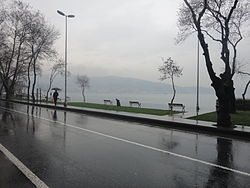
The climate of Istanbul, classified variously as Mediterranean, oceanic, or a transitional climate between the two, is temperate; with cool, frequently rainy, somewhat snowy winters, and warm to hot, moderately dry summers. Strongly influenced by the Sea of Marmara to the south and the Black Sea to the north, it is thoroughly maritime; precipitation is moderately high, fog is frequent, and seasonal lag is noticeable both in winter and in summer. The city is sheltered from both extreme heat and frigid temperatures, with temperatures rarely reaching 33 °C (91 °F) or dipping below −6 °C (21 °F).[1]
Precipitation is unevenly distributed, with winter generally experiencing very frequent precipitation, while summers are generally dry, punctuated by infrequent showers. Cloudiness also varies drastically by season; while the city has winters that receive less than one fifth of the possible sunshine duration, comparable to cities in northwestern Europe, in summer the city gets considerably more sunshine than most of Western and Central Europe.
Istanbul's climate is rapidly changing due to the combined effects of climate change and the city's urban heat island. Recent data shows an immense increase in daily low temperatures, and some increase in daily highs.
General climate
Temperature
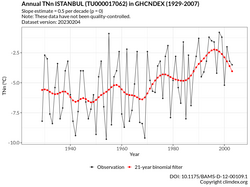
Istanbul's average temperature is around 14 °C (57 °F), placing the city on the warmer end of the temperate zone. Its coldest month is usually February, with an average temperature of 5 °C (41 °F), while its warmest month is usually August, with an average temperature of 23 °C (73 °F). Unsurprisingly, Istanbul's temperature range is narrow for a non-oceanside locale. The mean maximum (hottest temperature in an average year), is about 33 °C (91 °F), while the mean minimum (coldest temperature in an average year) is about −6 °C (21 °F).[1] This is largely due to the city's narrow diurnal temperature range, as Istanbul's hottest days are generally milder than other cities with similar daytime temperatures, such as Portland, Oregon , despite having a larger annual temperature range. Istanbul's climate is also well known for its noticeable seasonal lag; it is one of the few cities in the temperate Northern Hemisphere where March is, on average, colder than December.[2]
Summers in the city are dominated by stable, northeasterly meltem-like air, with a narrow range of daytime temperatures, generally around 25 °C (77 °F) to 32 °C (90 °F). A temperature of 38 °C (100 °F) is only seen around once every ten years.[1] Despite this, Istanbul's summer climate is generally seen as relatively uncomfortable, largely due to persistently high dew points; most thermal comfort indices rate July and August to be less comfortable overall than June and September.[3]
Winters are more variable; still with relatively stable daytime temperatures generally around 4 °C (40 °F) to 10 °C (50 °F), but with abrupt, short-term extremes. The dominant northeasterly loses its dry quality in this time of year, giving way to a more moist wind flow, termed Poyraz (ultimately from Ancient Greek:) from the same direction, causing persistent precipitation, sometimes in the form of snow; although still incapable of producing extreme cold due to its maritime nature.[4][5] The Lodos (ultimately from Ancient Greek:) is the southwesterly, warm and dry airflow "competing" with the northeasterly Poyraz, and is responsible for the occasional day above 15 °C (59 °F)[lower-alpha 2] in the city, as well as numerous severe windstorms.[6] Therefore, while warmth records in winter are usually associated with and always colloquially blamed on the Lodos, cold records are the product of rare windless nights.[4]
Spring and fall are mild, with transitional qualities between summer and winter; spring is generally colder than fall due to seasonal lag, but both score highly on comfort indices.[3]
It is somewhat well-established that summer mean temperatures have risen from about 20–22 °C (68–72 °F) during pre-industrial times, to about 23–25 °C (73–77 °F) over the last two centuries, according to reconstructions done by Luterbacher et al.[7] The same pattern is not found to the same extent in winter, where temperatures have seen no perceptible increase until very recently.[8] This points to the combined effect of climate change and the urban heat island, which increases in intensity during the nights of the city's largely sunny summer days.Template:Weatherbox
Precipitation
.jpg)
Istanbul's precipitation varies considerably between years and districts. On average, however, it experiences around 800 millimetres (31 in) of precipitation annually. Most of this falls in the colder half-year, with around 100 millimetres (4 in) to 150 millimetres (6 in) of precipitation in the wettest months. In the warmer half-year, precipitation ranges from 10 millimetres (0.4 in) to 50 millimetres (2 in) depending on location, month and year, with prolonged dry periods punctuated by abrupt, heavy showers and thunderstorms, sometimes severe.
As Istanbul receives some amount of precipitation from both Western European and Mediterranean systems, precipitation, especially in the winter half-year, is frequent and light, which is unusual for the Mediterranean basin: the average number of rainy days in the city is 131, and in some parts this may reach up to 152. Furthermore, during early and mid-winter, the city's frequency of precipitation is virtually unparalleled in the Mediterranean basin; January averages 20 days of precipitation when counting trace accumulations,[9] 17 when using a 0.1 mm threshold, and 12 when using a 1.0 mm threshold, on par with cities such as Brussels, and rainier than famously humid locales in Western Europe, such as London.[10]
Rain remains the dominant form of precipitation throughout the year, with snow representing only one fourth of precipitation even in the coldest months of January and February.[9] Despite this, an annual average of more than 60 centimeters (24 in) of snow falls on the area of the airport, making Istanbul the snowiest major city in the Mediterranean basin.[1][11] Snowfall varies widely between years and different areas of the city, with districts facing north more prone to receive snow than southerly ones. This effect is largely caused by lake-effect snow, which forms when cold air, originating from the North Pole or Siberia, develops into moist and unstable air that ascends to form snow squalls along the lee shores of the Black Sea, upon contact with the relatively warm water.[2] These snow squalls are heavy snow bands and occasionally thundersnows, with accumulation rates approaching 5–8 centimeters (2–3 in) per hour.[12] It is also important to note that almost half of snowy periods do not leave accumulated snow for more than a day, reducing the 'number of days with snow cover' statistic, published daily[lower-alpha 3] by the TSMS, by half.[13][14]
Particularly severe winter storms have included January 1942, March 1987, and most recently January 2017 and 2022.[15] Some of these broke daily snow depth[lower-alpha 4] records, with 80 centimeters (2.6 ft; 31 in) on 4 January 1942, and 104 centimeters (3.41 ft; 41 in) in the northern suburbs on 11 January 2017; unofficial measurements in hilly and northern regions have included 85 centimeters (2.79 ft; 33 in) in March 2022, and a putative measurement of 4 meters (13 ft; 160 in) in some snow drifts in March 1987.[16][2][17][18]
Normally uncommon precipitation types, especially graupel (Turkish: Kar paleti, Turkish: Bulgur or Turkish: Kuzudişi) are a staple of winter due to insufficient cooling of the southern Black Sea, somewhat well known internationally for delaying a Champions League match between Galatasaray and Juventus.[lower-alpha 5][19][20]
Sunshine and cloudiness

Istanbul's sunshine is profoundly seasonal, with cloudy winters and mostly sunny summers. Yearly, it averages around 2000 hours of sunshine, a midway point between the Mediterranean and oceanic regions of Europe.
In winter, the city is known for its persistently cloudy weather, with many regions getting less than 20 percent of their potential sunlight, and winter months of certain years getting less than 30 hours - equivalent to less than one tenth of possible sunshine.[21] This brings Istanbul's sunshine hours to levels closer to Western Europe, while its generally sunny summers create a seasonal sunshine pattern perhaps most closely mirrored by Cascadia, specifically Seattle.
Fog is known to be a major component limiting sunshine in Istanbul. Data before 1980 count annual foggy and misty days at above 200, and in some summer months, records show more than 25 days of fog and mist.[22][23] This has had cultural implications, most famously on poetry; an "obstinate mist" (Ottoman Turkish: دودمعند, romanized: dûd-ı mu'annid) symbolizes the persistently oppressive nature of Abdülhamid II's Istanbul in Tevfik Fikret's "The Fog" (Turkish: Sis).[24]
However, fog has been steadily declining since the 1970s. Data from the 1980s show around 100 days of fog and mist, and this has declined to about 60 in the last 10 years.[25] This is likely due to the city's urban heat island, which has been raising overnight temperatures since the city's initial rapid expansion in the 1950s and 60s.[26] While forested regions outside the city (especially in nearby Kocaeli Province) have lagged behind in the decrease of fog - the station in Gölcük had consistently been seeing over 200 days of fog until 1993, and now also averages around 60 - the decrease of fog poses a significant threat to the flora of the region, which feed on morning humidity in the relatively dry summer months.[27]
Severe weather
Istanbul's climate is generally not conducive to severe weather, due to its temperate climate, frequent but light rainfall and maritime heating and cooling. However, instances of severe weather do occur in Istanbul with some regularity, mostly in the form of heavy snow,[lower-alpha 6] severe thunderstorms and heatwaves.
Thunderstorms
.jpg)
Istanbul experiences around 10–15 days of thunderstorms, with a primary peak in June, and another one in September.[28] Unlike many central European cities, July and August are too dry to support a high amount of thunderstorms, and yet unlike many cities in the Mediterranean basin, winters are too cold and cloudy to support thunderstorms, causing two warm-season stormy periods with a summerly nadir in between.[28]
Despite the relatively uncommon nature of thunderstorms in the city, a notable anomaly is the amount of strong to severe[lower-alpha 7] thunderstorms that occur yearly; about half of the thunderstorms that occur in the city (about 6–7) can be qualified as such.[28] These thunderstorms peak around early-fall, likely due to warmer waters; while their anomalously high number is likely due to high wind shear and other conditions conducive to severe storm development.[28][29]
Very damaging storms have happened on a somewhat consistent basis, a significant one in recent memory is the July 2017 storm, where 9 cm (3.5 in) hail causing damage to buildings, straight line winds of 100 kilometres per hour (62 mph) and widespread flooding was recorded.[30][31][32] Tornadoes are uncommon, but not impossible, with recent storms in 2020 and 2021 dropping weak, non-damaging tornadoes.[33]
Heat waves
Due to its maritime position, Istanbul is not susceptible to heat waves by southern European standards. Not only do cities with cooler summers[lower-alpha 8] often have higher summer temperature records than Istanbul, Istanbul escapes heat-waves even when they happen over northwestern Turkey. Most recently in September 2022, when southern Marmara was experiencing daily highs of about 37–38 °C (99–100 °F), Istanbul's high temperature was 29 °C (84 °F), with a strong northeasterly wind.[34][35]
However, studies have shown that heatwaves, when they do happen, can and do cause excess death in the largely unprepared population. Four heat waves in the years 2013 to 2017, two of which happened in the year 2017, where every summer month anomalously experienced at least one day above 36 °C (97 °F), show that excess deaths do increase substantially during heatwaves.[36]
Sea temperatures
Unsurprisingly, Istanbul's sea temperatures are warmer than its climate, in accordance with its place in the general Mediterranean region; this generally means that places farther away from the sea experience colder weather, especially in winter. Its 'cool but not cold' winter sea temperatures also have a major effect on the city's precipitation, especially on sea-effect snow.[12]
| Climate data for Istanbul | |||||||||||||
|---|---|---|---|---|---|---|---|---|---|---|---|---|---|
| Month | Jan | Feb | Mar | Apr | May | Jun | Jul | Aug | Sep | Oct | Nov | Dec | Year |
| Average sea temperature °C (°F) | 8.4
(47.1) |
7.7
(45.9) |
8.3
(46.9) |
10.2
(50.4) |
15.5
(59.9) |
21.3
(70.3) |
24.6
(76.3) |
24.9
(76.8) |
22.8
(73.0) |
18.4
(65.1) |
13.8
(56.8) |
10.5
(50.9) |
15.5
(60.0) |
| Source: Weather Atlas [37] | |||||||||||||
Classification
Template:SchemeboxThe transitional nature of Istanbul's climate causes divergence in classification and nomenclature. According to Köppen and Trewartha, Istanbul has a borderline Mediterranean climate, humid subtropical climate and oceanic climate. Thornthwaite classifies most of the city as B1 B'2 s b'4,[lower-alpha 9] while the semi-official Atalay system classifies it as a Mediterranean-oceanic transitional climate.[38] Other nomenclature used to classify the city include 'Temperate transitional climate' and 'sub-continental-sub-Mediterranean transition climate'.[39]
In stark contrast to the divergence in classification in generalist classifications, precipitation-based classifications generally concur that Istanbul is moist subhumid in the south and humid in the north. Only the Aydeniz aridity classification diverges from this, calling the city 'humid to perhumid', largely due to high relative humidity and fog.[40]
It is known that Istanbul's climate classification, according to Köppen, has changed over the last century. As summer means used to be around 20–22 °C (68–72 °F), the city used to not have a hot-summer region, instead having the classification Csb/Cfb.[7] Decadal trends and seminormals also indicate that by the new normals encompassing 2030, no part of Istanbul will have a warm-summer climate.[41]
Areas and microclimates
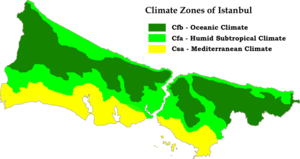
Because of its hilly topography and maritime influences, Istanbul exhibits a multitude of distinct microclimates.[42] Average temperatures range from 12 °C (54 °F) to 15 °C (59 °F) depending on location, rainfall varies widely from around 600 millimeters (24 in) on the southern fringe at Florya to 1,200 millimeters (47 in) on the northern fringe at Bahçeköy, and sunshine ranges from 2300 hours to 1800 hours depending on location.[43]
Furthermore, while the city itself lies in USDA hardiness zones 9a to 9b, its inland suburbs lie in zone 8b with isolated pockets of zone 8a, restricting the cultivation of subtropical plants to the coasts.[44][45]
Marmara coast
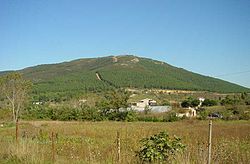
The warmest and driest region of Istanbul, the Marmara coast is considered to have a Mediterranean climate by both Köppen and Trewartha. Bohn, however, considers the area sub-Mediterranean as with the rest of Istanbul, and comments that the region is "protected from cold winds due to their location on southern slopes at the sea, [has] very high water deficiency in summer."[39] Thornthwaite also considers the region "s2", "with considerable summer drought".
Its summers are some of the hottest in the province, with summerly means reaching 25 °C (77 °F) in July and August in some areas; although Bohn argues that if the region hadn't been thoroughly urbanized, this value would have been 20 °C (68 °F) to 23 °C (73 °F).[39]
Winter temperatures are also higher, with daily means of about 6 °C (43 °F) in January and February over the lowlands, while some hills experience average temperatures around 4 °C (39 °F).[39] The area largely lies in USDA hardiness zones 9a and 9b, with temperatures rarely falling below −5 °C (23 °F).[44]
Rainfall is generally around 600 millimetres (24 in) to 800 millimetres (31 in) throughout the region, although rainy days increase from west to east, with Pendik getting around 12 more days of precipitation than Florya.[46][47] The area is also relatively snow-poor, with less than 10 days of snow in all parts of the region,[46] around half of which accumulates and stays on the ground for more than a day.[13]
Sunshine ranges from 2000 to 2300 hours, with a notable west–east gradient, the eastern side being more cloudy.[47]Script error: No such module "weather box".Script error: No such module "weather box".
Inland from the Bosporus
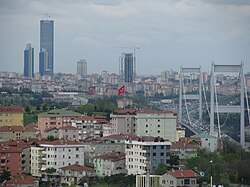
The climate near the Bosporus is cooler, wetter and cloudier, and represents a good average of the region of Istanbul. It is classified as humid subtropical by both Köppen and Trewartha, although non-urbanized and hilly regions are mostly oceanic, as was most of the region likely was before urbanization.[39] Bohn further comments on this region by stating that, starting here, the precipitation regime is profoundly impacted by the Black Sea.[39]
The coldest month generally averages around 5 °C (41 °F), with a USDA hardiness zone of 8b and 9a, while the warmest month seems to have experienced significant warming from 21 °C (70 °F) to 23 °C (73 °F).[44][39] Despite this, summer days are still relatively acceptable at around 27 °C (81 °F), with most of the warming happening during nighttime.
Precipitation generally averages around 800 millimetres (31 in) to 1,000 millimetres (39 in), with the Anatolian side getting more precipitation.[56] The lack of a real summer drought, with at least 30 mm (1.2 in) of precipitation every month, further distinguishes this region from the south. Snowfall is generally plentiful, due to the relatively continental nature of the region.
Sunshine is a bit lower than the southern coast, usually around 2000–2200 hours, yet still higher than the northern coasts.Script error: No such module "weather box".Script error: No such module "weather box".
Black sea coast

The Black Sea coast constitutes the still-oceanic part of Istanbul, with cooler temperatures especially in summer. Bohn characterizes it as a "moist-temperate climate by mostly north and northeastern winds by the Black Sea; [with] frequent formation of thew [sic] and mists in summer."[39]
Summer averages are generally around 21 °C (70 °F), with locales closer to the coast, such as Şile, experiencing very narrow diurnal temperature ranges. Winter averages depend on proximity to the coast; inland parts of the region have averages around 4 °C (39 °F) while coastal regions see winter temperatures close to the rest of the city. Accordingly, USDA hardiness zones are equally variable, from 9a around the coast to 8a in some inland valleys.[44]
Precipitation is variable, with averages ranging from 900 millimetres (35 in) to 1,200 millimetres (47 in), depending on location. Rainy days, more plentiful than the rest of the city, show the usual east–west gradient; with Şile getting up to 15 days more precipitation than Bahçeköy. Also notable is the sheer frequency of precipitation in some areas, as Şile averages above 20 days of precipitation in December.
Snowfall is plentiful due to proximity to the Black Sea coast, although along the coast the snowy season is shorter, with only around 1 day of snow in March.
Sunshine data in this region is relatively scarce, but the station in Kumköy averages around 1800 hours of sunshine, making it the cloudiest recorded area of Istanbul.Script error: No such module "weather box".Script error: No such module "weather box".
See also
- Climate of Turkey
- Climate change in Turkey
- SantralIstanbul
Notes
- ↑ Average of all stations in article.
- ↑ In northern parts of the city, Lodos functions as a Foehn wind, which can raise temperatures further to around 20 °C (68 °F) in rare occurrences. See the extreme temperature graph for information on this.
- ↑ This is crucial, as the measurement, made in 9am local time, does not count the snow that has fallen and melted over the previous 24 hours.
- ↑ Not snowfall, as these are not published officially.
- ↑ This was widely believed to be snow or hail, although it was neither.
- ↑ Extensively covered in the Precipitation section.
- ↑ The definition used for 'severe thunderstorm' in this study is less strict than the US definition, generally including all thunderstorms that can cause damage; strong to severe is likely the correct US equivalent.
- ↑ Paris is likely the most well-known example.
- ↑ A humid, mild mesothermal climate with moderate summer drought and very low continentality.
References
- ↑ 1.0 1.1 1.2 1.3 "Climatologie globale à Istanbul / Ataturk - Infoclimat". https://www.infoclimat.fr/climatologie/globale/istanbul-ataturk/17060.html.
- ↑ 2.0 2.1 2.2 2.3 "Resmi İstatistikler". Meteoroloji Genel Müdürlüğü. https://mgm.gov.tr/veridegerlendirme/il-ve-ilceler-istatistik.aspx?m=ISTANBUL.
- ↑ 3.0 3.1 Abbasnia, Mohsen; Toros, Hüseyin; Memarian, Hadi (2019). "Analysis of Climate in the Megacity of Istanbul Based on Human Bioclimatic Comfort Index". Journal of Research in Atmospheric Science 1 (1). ISSN 0000-0000. https://avesis.itu.edu.tr/yayin/26af2d5e-0c30-4b5d-83a5-9ffe2be7a179/analysis-of-climate-in-the-megacity-of-istanbul-based-on-human-bioclimatic-comfort-index.
- ↑ 4.0 4.1 KADIOĞLU, Prof Dr Mikdat. "Lodos ve poyrazın yaptıkları" (in tr). https://www.hurriyet.com.tr/lodos-ve-poyrazin-yaptiklari-12472532.
- ↑ Kindap, Tayfun (2010-09-01). "A severe sea-effect snow episode over the city of Istanbul" (in en). Natural Hazards 54 (3): 707–723. doi:10.1007/s11069-009-9496-7. ISSN 1573-0840. https://doi.org/10.1007/s11069-009-9496-7.
- ↑ Sariyuce, Isil (2021-11-30). "Extreme winds in Turkey kill 6 and injure 52" (in en). https://www.cnn.com/2021/11/30/middleeast/turkey-fatal-wind-storms-november-2021-intl/index.html.
- ↑ 7.0 7.1 "Climate Explorer: Time series plots per year". http://climexp.knmi.nl/plotseries.cgi?id=someone@somewhere&TYPE=i&WMO=Rapidluterbachertemp_27.98-29.92E_41.04-41.14N_n_su_3_&STATION=JJA_Luterbacher_et_al._Temperature_27.98-29.92E_41.04-41.14N&NAME=&KIND=yr.
- ↑ "Climate Explorer: Time series plots per year". http://climexp.knmi.nl/plotseries.cgi?id=someone@somewhere&TYPE=i&WMO=Rapidluterbachertemp_27.98-29.92E_41.04-41.14N_n_su_1_&STATION=DJF_Luterbacher_et_al._Temperature_27.98-29.92E_41.04-41.14N&NAME=&KIND=yr.
- ↑ 9.0 9.1 "Istanbul - Climate". https://www.myforecast.com/index.php?cwid=75918&metric=true#features.
- ↑ "Normales et records climatologiques 2011-2020 à SARIYER - Infoclimat". https://www.infoclimat.fr/climatologie/normales-records/2011-2020/sariyer/phenomenes/17061.html.
- ↑ "La neve sulle coste del Mediterraneo". http://www.nimbus.it/liguria/rlm44/neve_mediterraneo.htm.
- ↑ 12.0 12.1 Kindap, Tayfin (19 January 2010). "A Severe Sea-Effect Snow Episode Over the City of Istanbul". Natural Hazards 54 (3): 703–23. doi:10.1007/s11069-009-9496-7. ISSN 1573-0840.
- ↑ 13.0 13.1 "Mevsim Normalleri". https://www.mgm.gov.tr/veridegerlendirme/il-ve-ilceler-istatistik.aspx?k=A&m=İSTANBUL/FLORYA.
- ↑ "Snow depth, daily, observations Istanbul from 03/02/2023, 09:00am" (in en). https://meteologix.com/tr/observations/istanbul/snow-depth-daily/20230302-0600z.html.
- ↑ "İstanbul'da bazı ilçelerde kar kalınlığı 85 santimetreyi buldu". https://www.birgun.net/haber/istanbul-da-bazi-ilcelerde-kar-kalinligi-85-santimetreyi-buldu-374544.
- ↑ Arango, Tim (11 January 2017). "Snow Acts as a Magical Balm in an Anxious Turkey (Published 2017)". The New York Times. https://www.nytimes.com/2017/01/11/world/snow-in-istanbul.html.
- ↑ Tayanç, Mete; Karaca, Mehmet; Dalfes, H. Nüzhet (1998). "March 1987 Cyclone (Blizzard) over the Eastern Mediterranean and Balkan Region Associated with Blocking". Monthly Weather Review 126 (11): 3036. doi:2.0.CO;2">10.1175/1520-0493(1998)126<3036:MCBOTE>2.0.CO;2. Bibcode: 1998MWRv..126.3036T.
- ↑ "1987 İstanbul kışında neler yaşandı? Tarihe geçen kar fırtınasından çarpıcı fotoğraflar" (in tr). https://www.cumhuriyet.com.tr/galeri/1987-istanbul-kisinda-neler-yasandi-tarihe-gecen-kar-firtinasindan-carpici-fotograflar-1913825.
- ↑ Havadelisi (2013-12-10). "Juventus'u Kuzudişi (Graupel) Bile Kurtaramadı (O Yağış Kar Değildi)" (in tr-TR). https://havadelisi.com/2013/12/10/juventusu-kar-degil-bulgur-graupel-kurtardi/.
- ↑ Orru, Marco (2013-12-10). "Juventus-Galatasaray, non è stata neve, ma il 'Graupel'" (in it-IT). https://www.juvelive.it/2013/12/10/juventus-galatasaray-non-e-stata-neve-ma-il-graupel/.
- ↑ "Climatologie de l'année 2018 à Kumkoy - Infoclimat". https://www.infoclimat.fr/climatologie/annee/2018/kumkoy/valeurs/17059.html.
- ↑ "July 1950 Historical Weather at Istanbul Atatürk Airport, Turkey - Weather Spark" (in en). https://weatherspark.com/h/m/148608/1950/7/Historical-Weather-in-July-1950-at-Istanbul-Atatürk-Airport-Turkey#Figures-Temperature.
- ↑ "Istanbul, Turkey Marine Forecast | Current Conditions | NWS Alerts | Maps | Buoy Reports | Earth Quakes - MyForecast". https://www.myforecast.com/special-reports.php?cwid=75918&metric=true&condition=act&city_count=&zip_code=#features.
- ↑ Zariç, Mahfuz. "Recaî-Zâde Mahmut Ekrem'in "Nefrîn" ve Tevfik Fikret'in "Sis" Adlı Şiirleri Üzerine Karşılaştırmalı Bir İnceleme". Batman Üniversitesi. https://www.researchgate.net/publication/314450269.
- ↑ "Climatologie globale à Istanbul / Ataturk - Infoclimat". https://www.infoclimat.fr/climatologie/globale/istanbul-ataturk/17060.html.
- ↑ Karaca, M.; Anteplioĝlu, Ü.; Karsan, H. (1995-01-01). "Detection of urban heat island in Istanbul, Turkey" (in en). Il Nuovo Cimento C 18 (1): 49–55. doi:10.1007/BF02561458. ISSN 0390-5551. https://doi.org/10.1007/BF02561458.
- ↑ "Climatologie globale à Golcuk / Dumlupinar - Infoclimat". https://www.infoclimat.fr/climatologie/globale/golcuk-dumlupinar/17067.html.
- ↑ 28.0 28.1 28.2 28.3 Taszarek, Mateusz; Allen, John; Púčik, Tomáš; Groenemeijer, Pieter; Czernecki, Bartosz; Kolendowicz, Leszek; Lagouvardos, Kostas; Kotroni, Vasiliki et al. (2019-03-15). "A Climatology of Thunderstorms across Europe from a Synthesis of Multiple Data Sources" (in EN). Journal of Climate 32 (6): 1813–1837. doi:10.1175/JCLI-D-18-0372.1. ISSN 0894-8755. https://journals.ametsoc.org/view/journals/clim/32/6/jcli-d-18-0372.1.xml.
- ↑ Kahraman, Abdullah; Kadioglu, Mikdat; Markowski, Paul M. (2017-12-01). "Severe Convective Storm Environments in Turkey" (in EN). Monthly Weather Review 145 (12): 4711–4725. doi:10.1175/MWR-D-16-0338.1. ISSN 1520-0493. https://journals.ametsoc.org/view/journals/mwre/145/12/mwr-d-16-0338.1.xml.
- ↑ Baltaci, Hakki; Akkoyunlu, Bulent Oktay; Tayanc, Mete (2019), Vilibić, Ivica; Horvath, Kristian; Palau, José Luis, eds., "An Extreme Hailstorm on 27 July 2017 in Istanbul, Turkey: Synoptic Scale Circulation and Thermodynamic Evaluation" (in en), Meteorology and Climatology of the Mediterranean and Black Seas (Cham: Springer International Publishing): pp. 7–20, doi:10.1007/978-3-030-11958-4_2, ISBN 978-3-030-11958-4, https://doi.org/10.1007/978-3-030-11958-4_2, retrieved 2023-03-09
- ↑ SWE, Admin (2017-07-28). "Severe hailstorm, downburst and flash flooding in Istanbul, Turkey - July 27, 2017" (in en-US). https://www.severe-weather.eu/news/severe-hailstorm-downburst-and-flash-flooding-in-istanbul-turkey-july-27-2017/.
- ↑ Fox, Everton. "Severe storms batter Turkey's Istanbul" (in en). https://www.aljazeera.com/news/2017/7/28/severe-storms-batter-turkeys-istanbul.
- ↑ "Tornado, heavy summer rain hit Istanbul - Türkiye News" (in en). https://www.hurriyetdailynews.com/heavy-summer-rain-hits-istanbul-155939.
- ↑ "Climatologie mensuelle en septembre 2022 à Istanbul / Ataturk | climatologie depuis 1900 - Infoclimat". https://www.infoclimat.fr/climatologie-mensuelle/17060/septembre/2022/istanbul-ataturk.html.
- ↑ "Climatologie mensuelle en septembre 2022 à Bursa | climatologie depuis 1900 - Infoclimat". https://www.infoclimat.fr/climatologie-mensuelle/17116/septembre/2022/bursa.html.
- ↑ Can, Günay; Şahin, Ümit; Sayılı, Uğurcan; Dubé, Marjolaine; Kara, Beril; Acar, Hazal Cansu; İnan, Barış; Aksu Sayman, Özden et al. (2019). "Excess Mortality in Istanbul during Extreme Heat Waves between 2013 and 2017" (in en). International Journal of Environmental Research and Public Health 16 (22): 4348. doi:10.3390/ijerph16224348. ISSN 1660-4601. PMID 31703402.
- ↑ 37.0 37.1 "Istanbul, Turkey – Climate data". Weather Atlas. https://www.weather-atlas.com/en/turkey/istanbul-climate.
- ↑ Klimatoloji 2. Çevre ve Orman Bakanlığı. https://www.mgm.gov.tr/iklim/iklim.aspx?key=C.
- ↑ 39.0 39.1 39.2 39.3 39.4 39.5 39.6 39.7 39.8 Bohn, Udo; Germany. Bundesamt für Naturschutz. (2000), Karte der natürlichen Vegetation Europas: map of the natural vegetation of Europe, Bonn: Bundesamt für Naturschutz / Federal Agency for Nature Conservation, ISBN 978-3-7843-3837-8, https://discover.libraryhub.jisc.ac.uk/search?ti=Map of the Natural Vegetation of Europe&rn=1, retrieved 2023-02-19
- ↑ Güngör, Tolga (2019) (in tr). Belirli iklim sınıflandırmalarının Türkiye için karşılaştırmalı analizi. https://dspace.ankara.edu.tr/xmlui/handle/20.500.12575/68987.
- ↑ "Normales et records climatologiques 2011-2023 à SARIYER - Infoclimat". https://www.infoclimat.fr/climatologie/normales-records/2011-2023/sariyer/valeurs/17061.html.
- ↑ "Comparisons of Annual Meanprecipations of Annual Meanprecipitation Gridded and Station Data: An Example from Istanbul, Turkey Yıllık Ortalama Gridlenmiş Yağış Verisi ve İstasyon Yağış Verisinin Karşılaştırılması, İstanbul Örneği – USTAOĞLU – Marmara Coğrafya Dergisi". marmara.edu.tr. http://e-dergi.marmara.edu.tr/marucog/article/view/1012000723/1012000620/.
- ↑ "İstanbul Bölge Müdürlüğü'ne Bağlı İstasyonlarda Ölçülen Ekstrem Değerler" (in tr). Turkish State Meteorological Service. http://www.dmi.gov.tr/files/kurumsal/ekitap/4mevsim2/s5152.pdf.
- ↑ 44.0 44.1 44.2 44.3 "Bitki Soğuğa ve Sıcağa Dayanıklılık". https://www.mgm.gov.tr/tarim/bitki-soguga-ve-sicaga-dayaniklilik.aspx.
- ↑ "Bitki Soğuğa ve Sıcağa Dayanıklılık". https://www.mgm.gov.tr/tarim/bitki-soguga-ve-sicaga-dayaniklilik.aspx?g=b.
- ↑ 46.0 46.1 S.L, Tutiempo Network. "Climate SABIHA GOKCEN - Climate data (170630)" (in en). https://en.tutiempo.net/climate/ws-170630.html.
- ↑ 47.0 47.1 "Normales et records climatologiques 1991-2020 à SABIHA GOKCEN - Infoclimat". https://www.infoclimat.fr/climatologie/normales-records/1991-2020/sabiha-gokcen/valeurs/17063.html.
- ↑ "Meteoroloji Genel Müdürlüğü". https://www.mgm.gov.tr/veridegerlendirme/il-ve-ilceler-istatistik.aspx?k=H&m=İSTANBUL/FLORYA.
- ↑ "Normales et records climatologiques 1991-2020 à Istanbul / Ataturk - Infoclimat". https://www.infoclimat.fr/climatologie/normales-records/1991-2020/istanbul-ataturk/valeurs/17060.html.
- ↑ "Normales et records climatologiques 1981-2010 à Istanbul / Ataturk - Infoclimat". https://www.infoclimat.fr/climatologie/normales-records/1981-2010/istanbul-ataturk/valeurs/17060.html.
- ↑ "weather istanbul - turkey - weatheronline". https://www.weatheronline.co.uk/Turkey/Istanbul.htm.
- ↑ "Istanbul / Kurtköy - Weather History & Climate Data - Meteostat" (in en). https://meteostat.net/en/station/LTFJ0.
- ↑ "Pendik - Weather History & Climate Data - Meteostat" (in en). https://meteostat.net/en/place/TR-7PKE.
- ↑ S.L, Tutiempo Network. "Climate SABIHA GOKCEN - Climate data (170630)" (in en). https://en.tutiempo.net/climate/ws-170630.html.
- ↑ "Normales et records climatologiques 1991-2020 à SABIHA GOKCEN - Infoclimat". https://www.infoclimat.fr/climatologie/normales-records/1991-2020/sabiha-gokcen/valeurs/17063.html.
- ↑ Ustaoğlu, Beyza (2013-10-02). "Yıllık Ortalama Gridlenmiş Yağış Verisi ve İstasyon Yağış Verisinin Karşılaştırılması, İstanbul Örneği" (in tr). Marmara Coğrafya Dergisi (26): 71–81. ISSN 1303-2429. https://dergipark.org.tr/tr/pub/marucog/issue/473/3878.
- ↑ "Rivista Ligure di Meteorologia 44 - La neve sulle coste del Mediterraneo". http://www.nimbus.it/liguria/rlm44/neve_mediterraneo.htm.
- ↑ "Üsküdar - Weather History & Climate Data - Meteostat" (in en). https://meteostat.net/en/place/TR-38KV.
- ↑ Toros, Hüseyin; Abbasnia, Mohsen; Sagdic, Mustafa; Tayanç, Mete (2017-11-19). "Long-Term Variations of Temperature and Precipitation in the Megacity of Istanbul for the Development of Adaptation Strategies to Climate Change" (in en). https://www.hindawi.com/journals/amete/2017/6519856/.
- ↑ "Bahçeköy 1990-1999 Normals". http://www.ibb.gov.tr/tr-TR/BilgiHizmetleri/Istatistikler/Documents/fiziki/t474.pdf.
- ↑ "Climate Explorer: Time series". http://climexp.knmi.nl/gettemp.cgi?id=someone@somewhere&WMO=17059.2&STATION=BAHCEKOY_ORMAN&extraargs=.
- ↑ "Normales et records climatologiques 2010-2020 à Kumkoy - Infoclimat". https://www.infoclimat.fr/climatologie/normales-records/2010-2020/kumkoy/phenomenes/17059.html.
- ↑ "Climate Explorer: Time series". http://climexp.knmi.nl/gettempall.cgi?id=someone@somewhere&WMO=17062.3&STATION=SILE&extraargs=.
- ↑ S.L, Tutiempo Network. "Climate SILETURKEY - Climate data (170200)" (in en). https://en.tutiempo.net/climate/ws-170200.html.
↧ Download as ZWI file | Last modified: 08/04/2024 14:50:18 | 10 views
☰ Source: https://handwiki.org/wiki/Earth:Climate_of_Istanbul | License: CC BY-SA 3.0

 KSF
KSF